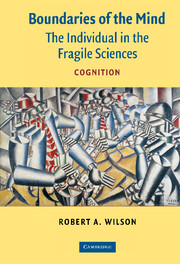Book contents
- Frontmatter
- Contents
- List of Tables and Figures
- Acknowledgments
- Boundaries of the Mind
- PART ONE DISCIPLINING THE INDIVIDUAL AND THE MIND
- PART TWO INDIVIDUALISM AND EXTERNALISM IN THE PHILOSOPHY OF MIND AND THE COGNITIVE SCIENCES
- 4 Individualism: Philosophical Foundations
- 5 Metaphysics, Mind, and Science: Two Views of Realization
- 6 Context-Sensitive Realizations
- 7 Representation, Computation, and Cognitive Science
- PART THREE THINKING THROUGH AND BEYOND THE BODY
- PART FOUR THE COGNITIVE METAPHOR IN THE BIOLOGICAL AND SOCIAL SCIENCES
- Notes
- References
- Index
6 - Context-Sensitive Realizations
Published online by Cambridge University Press: 02 December 2009
- Frontmatter
- Contents
- List of Tables and Figures
- Acknowledgments
- Boundaries of the Mind
- PART ONE DISCIPLINING THE INDIVIDUAL AND THE MIND
- PART TWO INDIVIDUALISM AND EXTERNALISM IN THE PHILOSOPHY OF MIND AND THE COGNITIVE SCIENCES
- 4 Individualism: Philosophical Foundations
- 5 Metaphysics, Mind, and Science: Two Views of Realization
- 6 Context-Sensitive Realizations
- 7 Representation, Computation, and Cognitive Science
- PART THREE THINKING THROUGH AND BEYOND THE BODY
- PART FOUR THE COGNITIVE METAPHOR IN THE BIOLOGICAL AND SOCIAL SCIENCES
- Notes
- References
- Index
Summary
ADJUSTING ONE'S METAPHYSICS
The argument of Chapter 5 provides a prima facie motivation for further exploring the context-sensitive view of realization. In this chapter, these explorations are of three kinds. Together they constitute a philosophical defense of the context-sensitive view.
The first concerns context-sensitive realizations and physicalism. Physicalism has been formulated both as a view of the mind-body relation and as a more encompassing metaphysical position, and one of the aims of the next three sections is to show what the context-sensitive view of realization implies about both of these forms of physicalism. Although there are forms of physicalism in the philosophy of mind that allow for the possibility that minds have nonphysical realizations, it remains true that the expression “physical realization” would be regarded by many as containing a redundancy. There are, so far as I know, no developed proposals for just how the mind would be “realized in” nonphysical stuff. Given this, it is important to show that the context-sensitive view of realization preserves robust forms of physicalism, even if, as I shall argue, it requires either giving up or revising several strands to physicalist thought. In this regard, in sections 2–4, I shall discuss, respectively, the thesis of microphysical determinism, the nature of dispositions, and nonreductive materialism.
The second kind of exploration considers modifications to the standard view of realization that address its putative shortcomings as a general view of realization.
- Type
- Chapter
- Information
- Boundaries of the MindThe Individual in the Fragile Sciences - Cognition, pp. 120 - 143Publisher: Cambridge University PressPrint publication year: 2004



